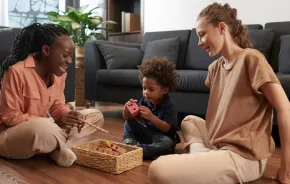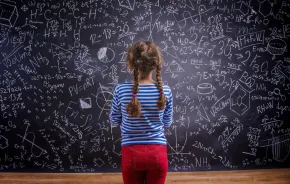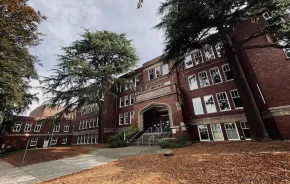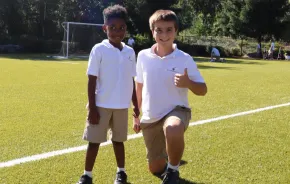
The relentless drive for academic excellence often overrides more indelible lessons in compassion. To raise A+ human beings, these longtime leaders in education say it’s time to rethink school culture.
A new book by pioneering Jewish educators Bruce Powell, Ph.D., and Ron Wolfson, Ph.D., M.A., proposes inspiring answers to illuminate a fundamental question about how we educate our children: Can kindness and academic excellence coexist?
Powell, who is celebrated for his career building top Jewish preparatory high schools, among them de Toledo High School in Los Angeles, maintains that the chief goal of secondary education is not to myopically strive for academic excellence, but to instead intentionally create a school culture that supports and prioritizes the formation of “A+ human beings.” Extending the academic metaphor, these qualities of school and community culture condition and impart what Powell and Wolfson refer to as “advanced- placement kindness.”
“Raising A+ Human Beings: Crafting a Jewish School Culture of Academic Excellence and AP Kindness” provides a blueprint for enculturating values, principles and best practices that enlists the active participation of teachers, administrators, students and their families to raise deeply compassionate humans to be successful in life — not just successful at making the grade.
In advance of their Oct. 27 talk, hosted by the Samis Foundation, ParentMap caught up with the coauthors to learn more about the book and the power of kindness in our kids’ lives.
Raising A+ Human BeingsA webinar by Bruce Powell, Ph.D., and Ron Wolfson, Ph.D., M.A., coauthors of “Raising A+ Human Beings: Crafting a Jewish School Culture of Academic Excellence and AP Kindness” |
What is an A+ human being and how do you articulate this idea of advanced-placement kindness?
Powell: I’m an English teacher by training, so I speak in metaphors. In founding Jewish high schools, and in Ron’s teaching as well, our ultimate goal [for] education is to raise up human character. I often use this analogy: You won’t read about anybody’s SAT score, their LSAT score, their MCAT score, their ERB score, their Iowa test score — whatever score it is — you won’t find it in their obituary. What you will find are the contributions those people have made to civilization, to society, to their communities, to their families. So, the metaphor that I came up with, in 1980, was being an A+ human being.
The notion of grades is all over the place in the society and in our American culture. So, why not use it and flip it? Instead of getting an A+ in calculus, you can get an A+ in humanity. Somehow it caught on. I would say to children, “You may not be an A student in calculus or chemistry, but you can be an A+ human being every day by simply doing a mitzvah, by doing a good deed, by improving humanity.
And that does not diminish my expectation as an educator that you also work as hard as you can in your academic subjects. But to achieve professional knowledge without values is very dangerous. We know that from the Holocaust; we know that most recently from gene editing. Jennifer Doudna, who is up at the University of California — Berkeley, was the queen of the gene-editing movement. And she can make you better, she can make Ron better, but it’s terrifying. We have the power of God in our hands.
And if we don’t learn, if we don’t have the values to control that power, we will create massive havoc beyond anything we can possibly imagine. And we know this from the atomic bomb, we know this from Hiroshima on Aug. 6, 1945. We know that this can happen. Brilliant people with a huge amount of knowledge brought into the world the power of the sun. And thank God, up to now we have had the values that [keep that power in check], but the value is interestingly not “This is a horror” — that’s some of it — but it’s the principle of “MAD”: mutual assured destruction. That’s what’s holding us back, because if you nuke me, I’m going to nuke you, right? And therefore, the whole world will be destroyed. And we know that it’s not necessarily being held back by some deeply held religious value, human value or American value we hold dear.
That’s where it came out of. If we can think like that, then we can use our knowledge and be an A+ human being and an A+ student at the same time. Or a C student. Colin Powell was a C student, by his own admission. Well, he was pretty important in the world. That’s my rant on A+.
Wolfson: We’re talking about metaphors, and when I first heard Bruce describe this to my students at the American Jewish University, I thought, he’s got to write a book about this because it’s so important, and not just for Jewish education. And this is what we’re finding with the book. It’s been out now almost six months, and it’s a runaway bestseller in the Jewish community. People — especially parents — are telling us that this language, these metaphors, are really powerful, and not just for our kids and grandkids. [They’re saying] we wish the politicians would adopt advanced-placement kindness, which starts with the recognition that every human being is made in the image of God — however you think of God. In Jewish tradition, that’s kind of the core value: If we treated each other as someone who has the spark of divinity, all these questions about gossip and about the cliques and about other things that happen in schools would not be as prominent in our educational circles.
So, I agree with Bruce that the power of language is really extremely important. And what we’re finding in the schools that have adopted the book as a community read, as they have in Seattle extraordinarily, with the help of the Samis Foundation, is that everyone now is literally on the same page, literally knowing the same language, and can talk with fluency about these metaphors and inspire students, teachers, families and administrative staff to deepen the cultures that they already have.
Can you expand on what you mean by “community read”?
Wolfson: We wrote the book to be read by teams of people in the school. The chapters are rather short, and there are questions for discussion at the end of each chapter. We included a chapter for parents and grandparents, because they are important partners in creating culture of schools and in the home. We really do believe that when everybody has read the same book — whether it’s ours or some other book —it stimulates conversation, and, more importantly, a deepening of cultures that we’re hoping to influence. Both of us are educators, so we’re always looking for ways to share what we’ve learned working all these years in education.
Can you speak to some of ideas and tools of building culture in a school, such as a culture audit?
Powell: The book is basically a description of how we started de Toledo High School. Everything that’s done in the school is a culture audit. So, is there an actual process that we do? Not explicitly, but implicitly.
There’s an expression that what we measure is what we believe to be important. So, if you look at your checkbook ledger and you take out food, clothing, shelter and stuff that you have to have to in order to live, you will see, what did we spend all of our extra money on? In a way, it’s a culture audit. We spend all of our additional cash on a Jewish education, on college and on weddings, right? Everything else was food, clothing and shelter, and a periodic vacation with the family.
How schools spend their money, how institutions spend their money, is a form of a cultural audit, because what adults spend their time on and their money on is what they believe in. What the U.S. government spends its money on clearly is a big debate now: Do you believe in more debt or do you believe in fewer homeless? Do you believe in more early childhood education or do you believe in saving more money? It’s a values discussion. It’s an audit. The voters are going to audit the people who argue on either side, and vote them into office or vote them out of office. That’s an audit — an election is an audit.
Parents audit the values in their own home. What you ask your children when they come home from school is what you believe to be important. What you talk about around the dinner table is a daily audit. If you ask your kids about math, you believe math is important. I always asked my kids, “Are you fluent in Hebrew yet?” They understood that’s what I thought was important. And guess what? They’re all fluent in Hebrew! And a couple of them were really good at math. A couple aren’t.
Wolfson: Did you do a mitzvah today? Were you kind to a stranger? Did you sit with the new kid at the lunch table? All of those are part of it, too.
Powell: At every graduation at de Toledo High School, we ask our seniors the six questions God asks of us when we pass from this world, according to the Talmud. Amazing questions. First question. Were you honest in business? Did you make a set time to study? Did you have hope? Did you raise up community? Did you act with wisdom? And did you understand a big thing from a small thing — [i.e.] did you have perspective?
We ask those six questions at every graduation: “Are you going to be honest in business? Are you going to make a set time to study in whatever field? Are you going to have hope in a world that sometimes feels a little bit hopeless?”
Would you say that hope is a key antidote to counteract the pandemic malaise many kids are feeling?
Powell: If we audit that our kids have hope and understand the big thing from the small thing, [we can] really help them to deeply understand that COVID is going to be a blip in the history of the country. Okay, it’s happening — we need to be resilient. And the way we can be resilient is always having hope. That’s supporting our scientists and understanding a big thing from a small thing. And the big thing is still community and making sure that everyone has a place at the table for lunch, metaphorically. And so, it all blends together. There’s no separation. There’s an audit all the time — we’re always auditing. We just don’t realize it.
Wolfson: This book is filled with stories. One of the things I encouraged Bruce to do when we started the project was to illustrate the principles of culture creation with stories, from his experience. And I contributed some of my stories, because people remember the stories, and then can apply the principles to individual settings. There are some best practices in the book, but we were much more concerned about getting the principles across. The practices will be different in different schools and different situations. But once you understand the principle, you can apply it to your particular setting.
So, are kindness and goodness compatible with academic excellence?
Wolfson: We both have been around the block in education circles for a long time. And what we found is that when you create a culture of kindness and humanity, kids perform better, they learn more deeply. They excel because they’re comfortable; they’re not in a culture that is backbiting. If you create a culture like Bruce has done in his schools, those kids have a big boulder off their shoulder, and it enables them to do better academically. It’s not just that there’s a false dichotomy between the two: It’s that each one supports the other.
Do you feel like the timing of the book was accelerated or made more urgent in your view given not just the pandemic, but the political climate and the alarming rise of anti-Semitism?
Powell: It wasn’t written for that purpose. I’ve always felt this way, from the time I started in education in 1970. I’ve always felt that a kindness component as needed, no matter who was president. But, yes, it seems that it’s hit a nerve here.
Some people don’t understand that wearing a mask in a crowded public place is a form of advanced-placement kindness. It’s also a form of obligation to the other. The word obligation, I explain to people, contains the Latin root lig, as in ligament. We are ob-lig-ated to wear the mask so that I don’t harm you and you don’t harm me. It’s such a simple thing.
My daughter was at a basketball game with her 10-year-old son, and some middle-school kids were coming who were going to play next in the gym. She walked up to them and asked the kids to please put on a mask while they were waiting. And they were just downright rude. They had not been taught yet.
Advanced-placement kindness is not caught, it’s taught. It doesn't just happen. Kids have to be taught. And it has to be said redundantly all the time, like learning language, including at home.
Wolfson: That’s why the last chapter is about parents and grandparents, and how important their role is in supporting this work. Kids hear everything and they model everything. So, when parents and grandparents are on the same page as the school, and they reinforce each other, there’s a much better chance that the kids are going to see that this is not just something that is sledgehammered into their brain and their hearts [at school], but that it’s something that we practice at home, too. I’ve worked for many, many years in family education, and parents and grandparents have to understand that their role is absolutely critical as partners with the school in raising these kids.
How can school leaders best engage and empower parents and grandparents as part of building a relational school culture?
Wolfson: Communication between the school and the parents is really critical in the process. It goes far beyond the annual or semester teacher-parent conference. That’s clearly not enough. I wrote a book called “Relational Judaism,” in which I argue that relationships are the core of all of our communities, including in a school. The relationships between the teachers and the parents need to be cultivated.
Powell: Let’s create a culture of covenant, if you will, where the teachers write their commitments to the parents and the parents write their covenant with the teachers.
Wolfson: We’re talking about something deeper, a deeper connectedness around the understanding that the teacher-parent relationship should be a true partnership in doing the best for the kids, because both are so critical in raising them.
Powell: There’s a great Jewish story: If you’re standing by a river and you see your teacher drowning and your parent drowning, who do you save first, if you can only save one? The answer, of course, is you save your teacher, but the moral of the story is that your parent is your teacher.
Wolfson: Bruce’s point about redundancy [when it comes to creating and] recreating culture in the schools is really critical. I do a lot of work with synagogues, and I’ve said to people that one thing we’ve learned through the pandemic is that a synagogue is not a building, and a school is not a building either. It’s a community of relationships with a mission and a goal; it’s relationships here, there and everywhere: between teachers and students, between students and students, between the teachers and the home, between the administrators and the teachers, and between the teachers themselves as colleagues. Bruce likes to use the word soup — it’s a culture, a soup of relationships.
Being away from each other for over a year, or however long it was that we weren’t in person, has meant that we have to relearn the social skills that are a little frayed right now. But I think we’ll do fine with it, as long as we pay attention to it and don’t just assume it’s going to be starting up again and not doing the hard work of teaching and reteaching.
Powell: I just read a quote from a friend and colleague of mine about the expression “Power corrupts, and absolute power corrupts absolutely.” He said, “Power doesn’t corrupt, power reveals.” And I thought, exactly. And what does it reveal? It reveals what your true values are [and how you] actually comport yourself as a human being in this world.
We all have a certain modicum of power in our lives, whether it’s power over our children when they are younger; there’s a power, trust relationship with one’s spouse. We have a government that has power. In some cases, certain aspects of government have absolute power. But is it corrupting or is it revealing of what those values truly are?
This is the cultural audit. This is the values audit. This is the A+ human being aspiration, not only for our schools and for our parents, but for our nation.











